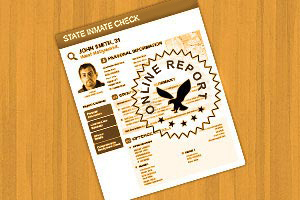Indiana Public Records
Indiana State Records has a mission to give every Indianan the tools needed to access and obtain government-generated public records. These tools aid in the exercising of every American’s right to find, examine, and copy public, criminal, court, vital, and arrest records as specified in the Indiana Access to Public Records Act.
The search function on this website offers the people of Indiana an easy, straightforward method for exercising their rights to acquire public records. This can be done with a name and an address and does not necessarily require personal information be revealed. The only case this may apply is when a record has been sealed or otherwise made private through legal action.
The records presented on this site contain information on criminal records, court records, vital records, and over 57 million transparent public records.
Are Indiana Records Public?
Indiana public records are mostly non-confidential records accessible to all state residents and non-residents. The Indiana Public Records Law defines and sets the procedure for obtaining Indiana public records. Furthermore, it outlines the function and responsibilities of record custodians in maintaining and issuing copies of documents to the general public. Per the IC 5-14-3-2, Indiana public records are all data or information generated or maintained by a government agency, board, division, department, bureau, or commission.
What is Considered Public Information in Indiana?
Public records in Indiana include, but are not limited to, the following:
- Indiana public arrest records
- Indiana accident logs
- Indiana sex offender information
- Indiana public court records
- Indiana divorce records
- Indiana marriage records
- Indiana inmate records.
- Criminal records and criminal history records
According to the Indiana Public Records Law, public records in Indiana encompasses any writing study, map, report, memoranda, tape recording, book, charters, or any material created, retained, or filed with a public agency. In addition, SMS, emails, and drafts are classified as public records in Indiana. The Indiana Public Records Law empowers public members to request, inspect, and get copies of public records from the respective custodian agency. Hence, a person can make a Public Records Law request to inspect or obtain copies of records online, in person, in writing, or by telephone. Nevertheless, the public records law redacts and withholds certain information from public access for confidentiality and privacy reasons. To this effect, a record official's personal mail and notes are mostly excluded from public disclosure. Generally, agencies may charge a record seeker a fee to copy public records, but a free public data search is available for those who just want to view such records.
How Do I Find Public Records in Indiana?
Record seekers can find public records in Indiana by contacting the designated record custodian for the document. For example, Indiana law enforcement agencies are the designated custodial for all arrest records, accident logs, and criminal records. In contrast, inmate records are maintained mainly by the Indiana Department of Corrections. That said, there are different ways of obtaining public records in Indiana. Nevertheless, record seekers can follow these general procedures to find public records in Indiana:
Know the Requirements for Accessing Public Documents in Indiana
Record seekers seeking to know how to access public records in Indiana must identify the specifics of the required record. To determine the requirements, record seekers must research the record custodian of the public document. Furthermore, requestors should note the requirements for getting such documents. For instance, requesters may need to provide a government-issued ID when accessing vital records in Indiana. In Indiana, the Vital Records Office will only issue copies of vital records to the record subject and other authorized persons.
Contact the Record Custodian in Charge of the Records
The Indiana Public Records Law mandates record custodians to maintain and issue copies of public documents to interested persons or entities, provided the records are not exempt under the state law. Thus, record seekers must contact the designated record custodians to obtain the necessary information. In addition, record seekers must note the agency's mode of issuing Indiana public records.
Custodian agencies in Indiana may have online or offline platforms where interested persons can access public documents. Sometimes, record custodians may only allow public inspection of the documents in their custody. That said, listed below are some of the custodian agencies in Indiana:
The Indiana Department of Corrections
Inmate records are obtainable via the Indiana Department of Corrections' online searchable portal. To access inmate records on the platform, record seekers may search using the offender's full name or inmate ID number.
Indiana Criminal Justice Institute
Established under the Indiana Department of Corrections, this record custodian oversees the state's sex and violent offenders registration. Furthermore, it maintains an online database where public members can access and view Indiana sex offenders’ information. Record seekers can view sex offender information by selecting the county where the offender resides.
Create and Send Request for Indiana Public Records
To get public records in Indiana, record seekers may write and send a request to a suitable record custodian. In some cases, record custodians may provide an online or downloadable request form template. In the absence of a specific request form, record seekers must write a request detailing the following data:
- The requester's full name
- The case number (this applies to court records);
- Preferred mode of delivery;
- Record seeker’s contact details;
- The record seeker’s full name and, or aliases;
- Purpose of the request - provide a detailed description of your request;
- Date range when the record was documented;
- The record subject's date of birth;
- Additional information to assist with the search.
Likewise, the Indiana Records Facility maintains an online request portal for obtaining most Indiana public records. The Records Facility is responsible for sending the filled-out form to the correct record custodian. In addition, it is responsible for shipping the requested documents to requesters. Record seekers may use the online request form by filling out these details:
- The type of information request;
- A clear description of the required record;
- Preferred method of obtaining the court record;
- Requester’s email address;
- Requester's full name and phone number.
Using Third-Party Sites to Find Public Records in Indiana
City Records
Public city records may also be accessible from third-party websites. These non-government platforms come with intuitive tools that allow for expansive searches. Record seekers may either opt to use these tools to search for a specific record or multiple records. However, users will need to provide enough information to assist with the search such as:
- The name of the subject involved in the record (subject must be older than 18 or not juvenile)
- The address of the requestor
- A case number or file number (if known)
- The location of the document or person involved
- The last known or current address of the registrant
Third-party sites are not sponsored by government agencies. Because of this, record availability and results may vary.
Public Records
Public records can also be accessed from third-party websites. These third-party, public records aggregate websites offer non-geographically limited search services, making the search result expansive and typically straightforward. However, users will need to provide enough information to assist with the search, such as:
- The name of the subject involved in the record, as long as the subject is not a juvenile
- The last known location of the record subject
Third-party public records search websites are not government-sponsored services. Therefore, the availability and accuracy of results can vary.
How Do I Look Up Public Records for Free in Indiana?
To lookup public records for free in Indiana inquirers may consider the following options:
First, some custodian agencies or departments allow requesters to inspect copies of public records documents via public computer terminals in their lobbies. For example, record seekers can view or review arrest records at the state's law enforcement agencies at no cost. Also, there is no charge to view documents at most Indiana County recorders' offices. In Indiana, certain court cases, child abuse registries, and protection orders are publicly available and free for all public members. Through a government-maintained online database, interested persons may access the following records for free:
- Indiana child abuse registry
- Indiana protection orders
- Trial court calendars
- Indiana marriage licenses
- Indiana commercial court documents
- Record retention schedules
To get information on child abuse records, interested persons may search using the offender's name, birth date, or case number. Note that a free public records search can only be done online.
Through an online platform, the state also issues copies of marriage licenses to interested parties for free at the specific county clerk's office website where the marriage was solemnized. The online platform features marriage licenses from 1993 to the present. Record seekers may obtain marriage records on the search portal by inputting the following data:
- Both record subject's full names;
- The exact marriage year (requesters may also choose a time range when the event occurred);
- The county where the marriage event was recorded.




